February 2019 Grant Recipients
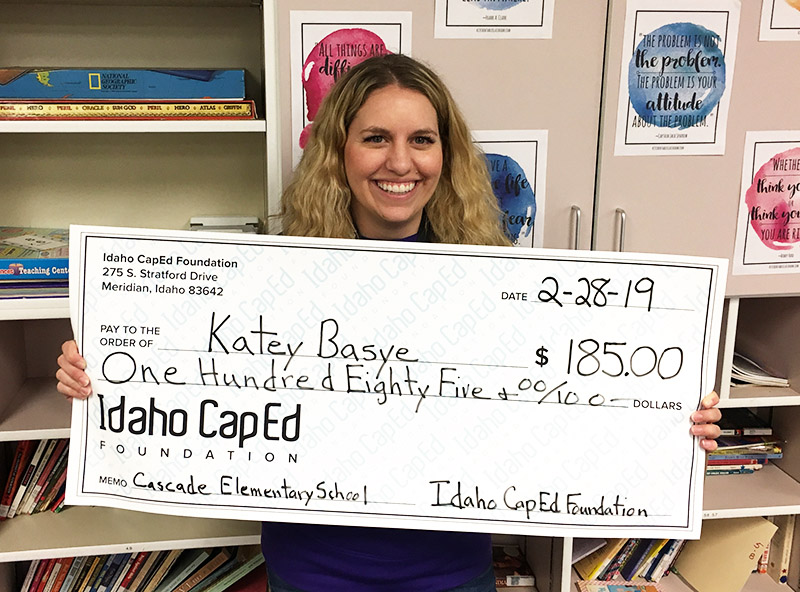
Math Manipulatives
Katey Basye - Cascade Elementary School, Cascade
$185.00
Some classrooms in our school have recently switched math programs to hopefully help students better understand the math processes. The 5th grade class I have this year has been noted as an under-performing group of students on the state math test. Some of these students will need to show between 60-90 points growth this year to be on track to become proficient by 2022. Most students grow about 30 points in a year. I have started an intervention program within the classroom to zone in on the missing skills. This math kit will allow the visual learners (most of my class) to really zone in on the skills and become successful in the basics before adding new skills. These manipulatives will not only help during intervention, but also during normal lessons day-to-day. They will be able to be used year after year.
Physics Lab Makeover for 5th Grade
Holly Harrison - Kershaw Intermediate, Sugar City
$602.52
Through this physics lab makeover, students will participate in yearlong amazing, exciting, beyond the textbook physical science units. Students will see how propellant affects height, speed, and velocity by building and launching rockets. They will use exact measurements to predict and report wind speed, wind direction, air pressure, precipitation, and temperature by using a classroom weather system. Families in our community will be able to access up-to-date current weather gathered through the classroom weather station by linking to our district and classroom website. These tools, instruments and supplies will be a benefit to my current students as well as then entire school for many years to come. As students are involved with these meaningful and enjoyable applications of physics, they will see how science is a part of our everyday life.
Electronic Circuit Systems Models
Brent Grote - Malad Elementary School, Malad City
$650.00
This project will fund the purchase of 25 electronic snap circuit systems to help students learn about energy, electricity, lighting, sound, transfer of energy, and other energy-related topics. Teams of 2-3 students will work on projects, such as wiring a small lamp, so that it turns on and off and wiring a small buzzer that actually buzzes when pushed. The students will start with projects outlined with the kits but then could take what they have learned to create their own projects. They will write reports outlining the steps taken to complete the project, what worked and what did not work, what they learned about electricity and energy, and what further modifications to their project they would make. They will present their projects to their parents and grandparents at Grandparents' Day when every grade level demonstrates a major project to the 350+ community members in attendance. This project will help the 3rd and 4th grade meet the Idaho State Science Standards.
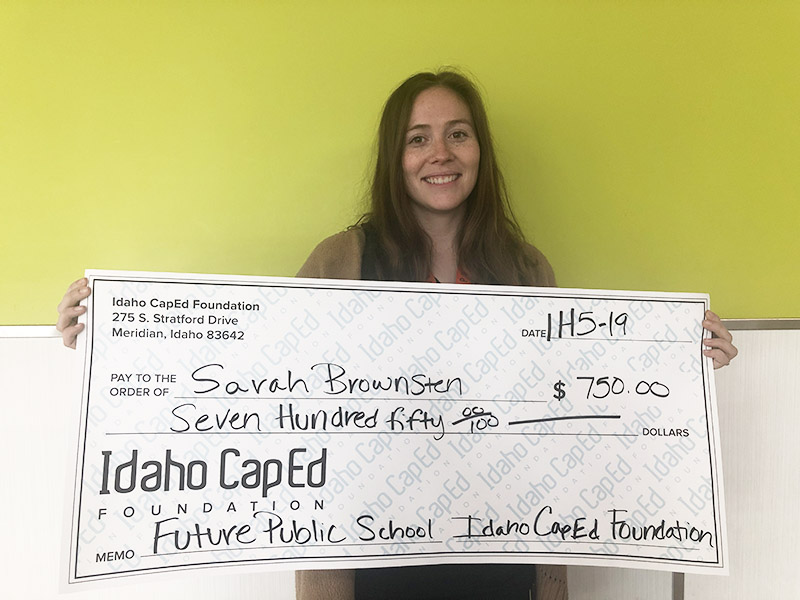
STEM for Kindergarten
Sarah Brownsten - Future Public School, Garden City
$705.95
We believe all children can have an engineer mindset and, given the right materials and guidance, children flourish using the Engineering Design Process. Our goal is for even the youngest students to have the confidence to use what they learn through their STEM learning for solving problems across curriculum. Both kindergarten classes at Future Public School are participating in Quest, a school-wide program that engages in both STEM learning and conversations about identity, community, and connection. For kindergarten, this is the introduction to the Engineering Design Process that will be continually implemented throughout their time at Future. During our Building Bridges Quest, students have a hands-on opportunity to plan, design, and revise various bridge builds without feeling pressure to get their bridge perfect the first time. In order to successfully engage the students' learning so they can develop an engineering mindset, we need more supplies. Funds for STEM in Kindergarten means that our current and future students would have more resources for a rich and comprehensive learning experience.
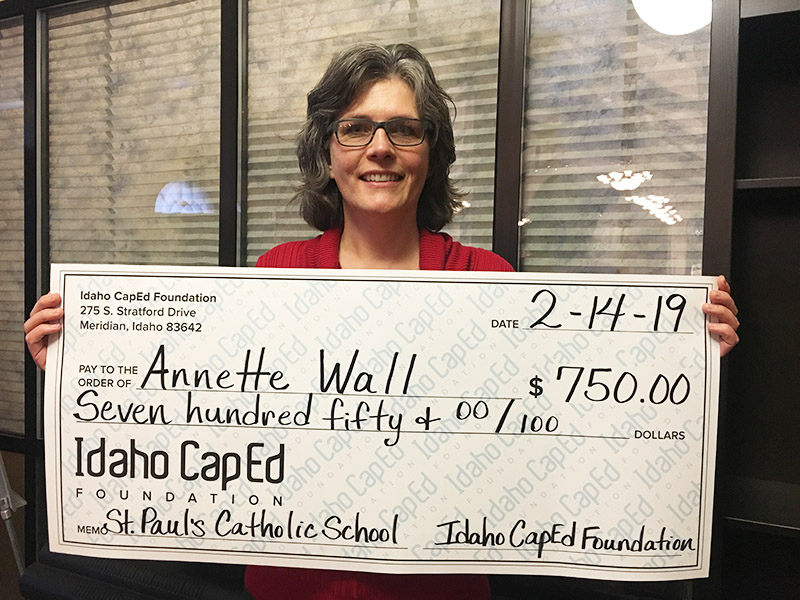
Nonfiction Trade Books for Classroom Libraries
Annette Wall - St. Paul's Catholic School, Nampa
$750.00
At the beginning of the 2018-2019 school year, 4th and 5th grades began using a new reading and writing curriculum (Units of Study in Reading and Writing) to help our student become better readers and writers. Instead of a reading textbook, the curriculum makes use of trade books to help reading become a more authentic experience for students. Students practice the skills they learn using self-selected books. While we have a number of fiction texts in our classroom libraries for our students to use, we have found that our nonfiction book selection is very limited and dated. With the help of our students, we will be selecting and purchasing nonfiction trade books at reading levels that are appropriately challenging for our students. The selection of books will also include biographies and books that tie into our social studies and STEM curriculum (such topics as American history, robotics, microbes, etc). We expect that our students will be very motivated to read nonfiction books that they helped select, and that by reading nonfiction texts of their choice they will be highly motivated to practice the specific reading skills they are learning about in the curriculum.
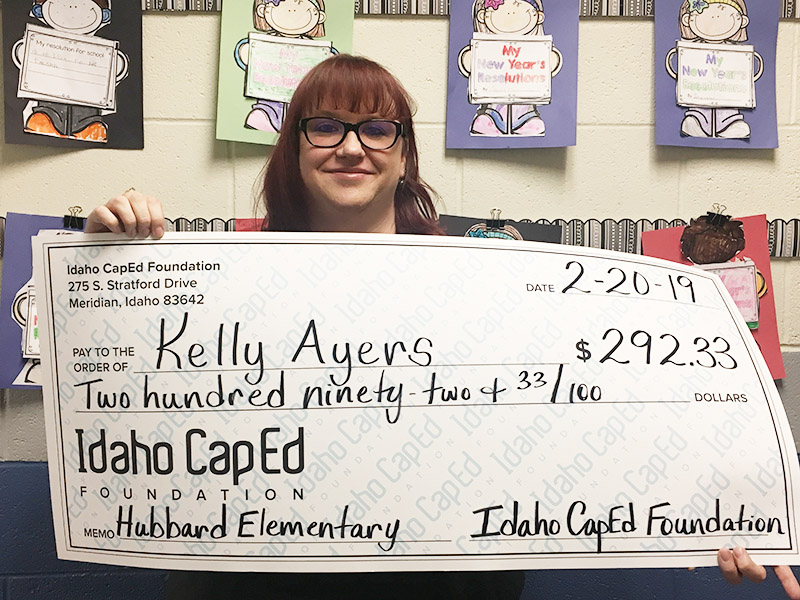
Classroom STEM Building Supplies
Kelly Ayers - Hubbard Elementary, Kuna
$292.33
In my classroom, I love to take a very hands-on approach to enhance understanding and overall engagement. I love project based ideas that yield fabulous conversations that are relevant and meaningful that typically start with a driving question or problem in which students must solve and then I place my second grade students in small collaborative groups armed with only some tin foil, paper, a few pipe cleaners, and their ideas. When we do these kinds of projects, there is only so many times I can give them the same supplies before it becomes stale. I do not have the supplies on hand in which to truly create a meaningful experience for my students. I have a very creative group of students this year who I want to challenge in every way and give them the opportunities to really stretch their ideas and gain a deeper level of thinking that only comes from these hand-on experiences. The funds from the grant will give multiple avenues for success and are durable for multiple years to come.
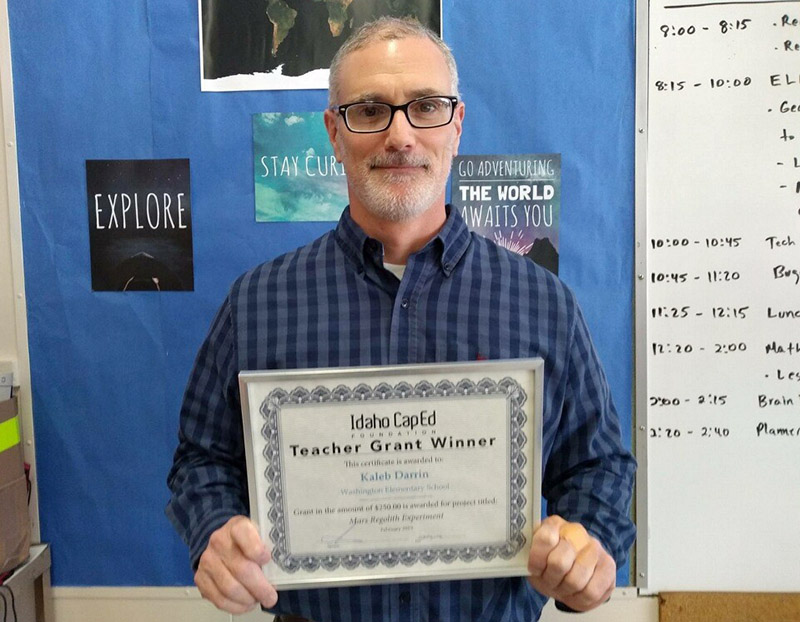
Mars Regolith Experiment
Kaleb Darrin - Washington Elementary School, Sandpoint
$250.00
The project I have planned for my class is to compare the results of germinating/growing different vegetable seeds in a variety of soil types, including Mars Regolith Simulant soil, to determine the most conducive substrate for growing a particular food crop. Students will subsequently report their results in an informative/explanatory research paper. The Mars Regolith Simulant soil closely approximates the soil found on Mars. As such, we will also be able to determine the efficacy of growing specific crops on "Mars”. The soil is mined from a location in the Mojave Desert of California and sterilized for the purpose of providing a simulation of the type of soil found on Mars. A company called The Martian Garden provides this product for educational and scientific research purposes and it is even used experimentally by NASA/JPL. This project is aligned with our district’s recently adopted, Next Generation Science Standards, as well as our Idaho Core English/Language Arts Curriculum.
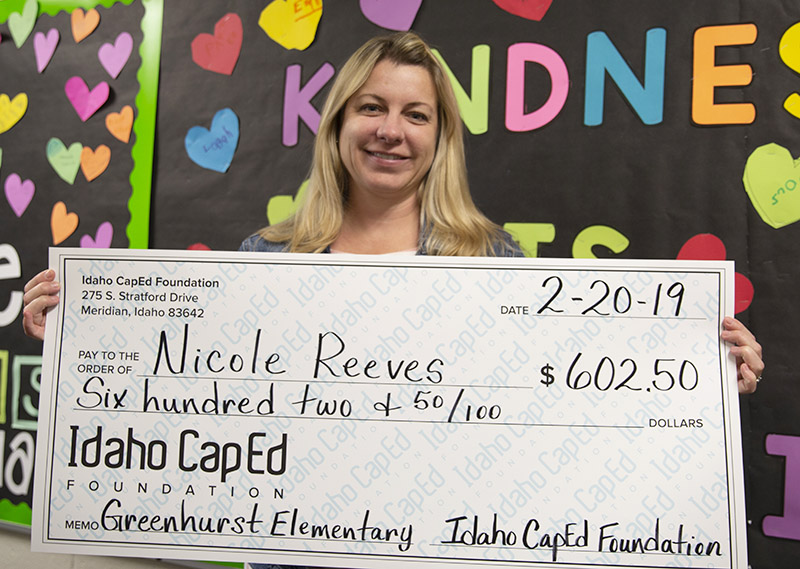
Readers Are Leaders
Nicole Reeves - Greenhurst Elementary School, Nampa
$602.50
With help from the grant, every third grade student at our school will have an opportunity to utilize engaging, hands on reading materials on their path to reading success. Students will be provided scaffolded content and differentiated support throughout their goal of content mastery while utilizing their very own classroom library! Our greatest needs are books, books, and more books for our leveled classroom library where students can select “just right” books. The ability to select “just right” books and set attainable goals ensures that our students of today become inspired, lifelong learners of tomorrow. I would also love to create a reading nook that makes books a central part of students school life. I’d love to incorporate phonics phones, flexible seating, and personal shelf space for each student.
Therapy Dog
Natalie Riggers - Nezperce School District, Nezperce
$714.71
Our PreK-12 school will be using the grant to assist us in training a therapy dog to serve as an emotional support animal for our students. The research we have read has proven to show significant gains in motivation and a decrease of stress caused by emotional and academic pressures. Results have also shown an increase in student learning affecting academic gains. Peer relationships are also strengthened through emotional well-being. Sometimes the dog will be working with small groups of children or with an individual child. The dog will be made available weekly to classrooms requesting his services. These times will be vary according to need. Times the dog will be available are before and after long breaks from school, prior to state and district assessments, during emotional crisis as when students experience loss or drastic change of home situations, as well as general community experiences that cause students extra emotional stress. This grant would help us pay for initial obedience training, which is a first step toward getting a dog certified as a therapy dog, as well as the equipment needed to house the dog at school.
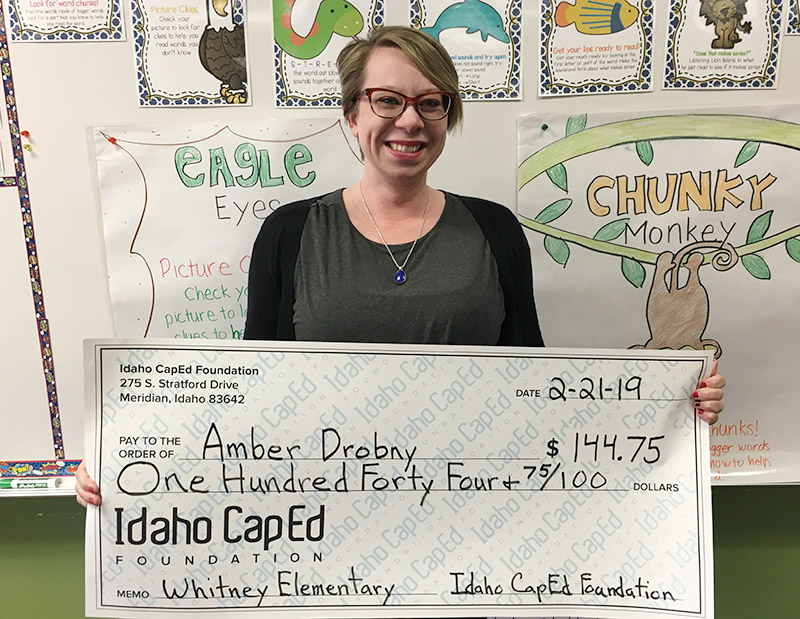
For the Love of Reading-Literature Circles in Second Grade
Amber Drobny - Whitney Elementary, Boise
$144.75
I pride myself on the fact that all my students receive a small reading group, with me, every day in my classroom. Having a large number of small groups allows me to meet the needs of every student! Plus I get to do my absolute favorite thing, which is read, read, read with my students! This year I am finding I have more kids who are ready to read chapter books than ever before! This request is made up strictly of early and middle reader chapter books so that I can push my students beyond fluency into the wide world of comprehension. These kids are ready to learn how to interact with books in an entirely new way! I will use these books to teach my students not only to read and comprehend the stories but also to lead a discussion about each part of the novel! The titles I selected for this grant are high interest and accessible to second grade students. Beyond that they are jam packed with jokes, adventure and great examples of problem solving. The expected outcome of this request is that it will not only increase my students ability to read fluently and comprehend literature at their reading level, but it will also get them excited to read books.
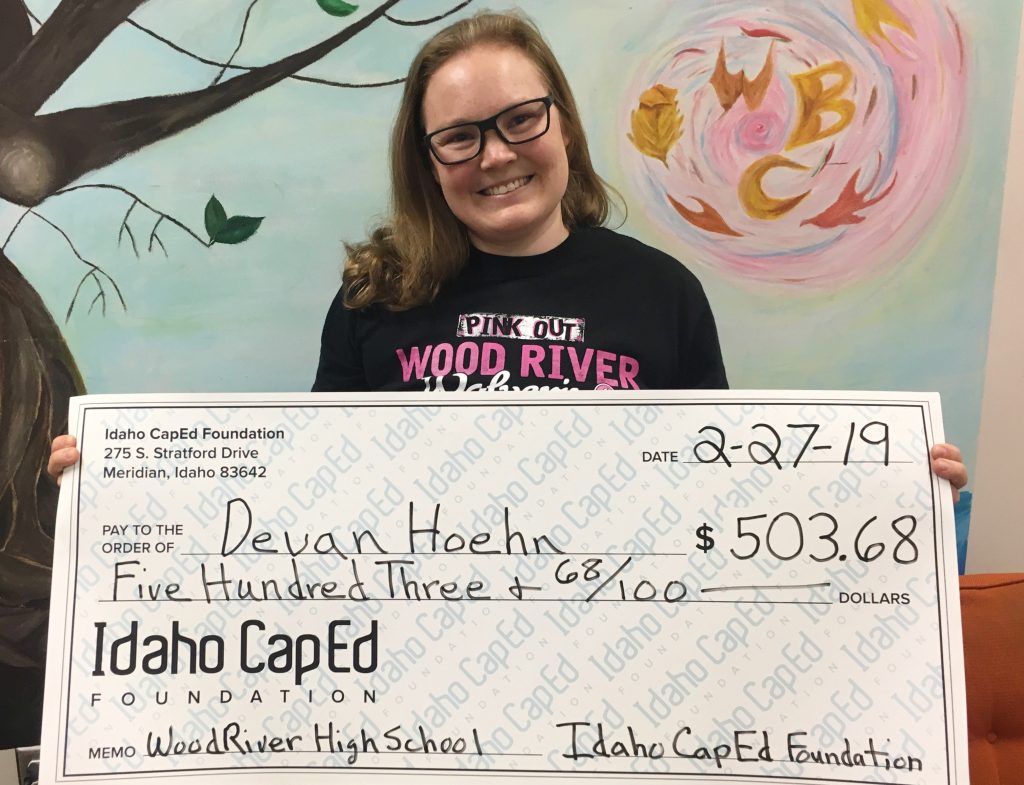
Vocabulary Development for ELLs
Devan Hoehn - Wood River High School, Hailey
$503.68
Visuals are so important for ELLs. In our co-taught Algebra 1 classroom, we work really hard to bring vocabulary to all students. Currently, we have the Algebra 1 cards and many discussions using academic language have happened because students are able to understand the word visually and feel confident using it. Because of how successful these cards have been in our co-taught class, I wanted to share the resource with my fellow Algebra 1 teachers. I also wanted to add more of their fantastic resources to our co-taught classroom, such as visuals on how to use a calculator and visual Mnemonic posters. There are also activities that encourage vocabulary usage between students. The activities that this program had will help build academic vocabulary between my ELL students and my non-ELL students. Building academic vocabulary is a skill all students need!